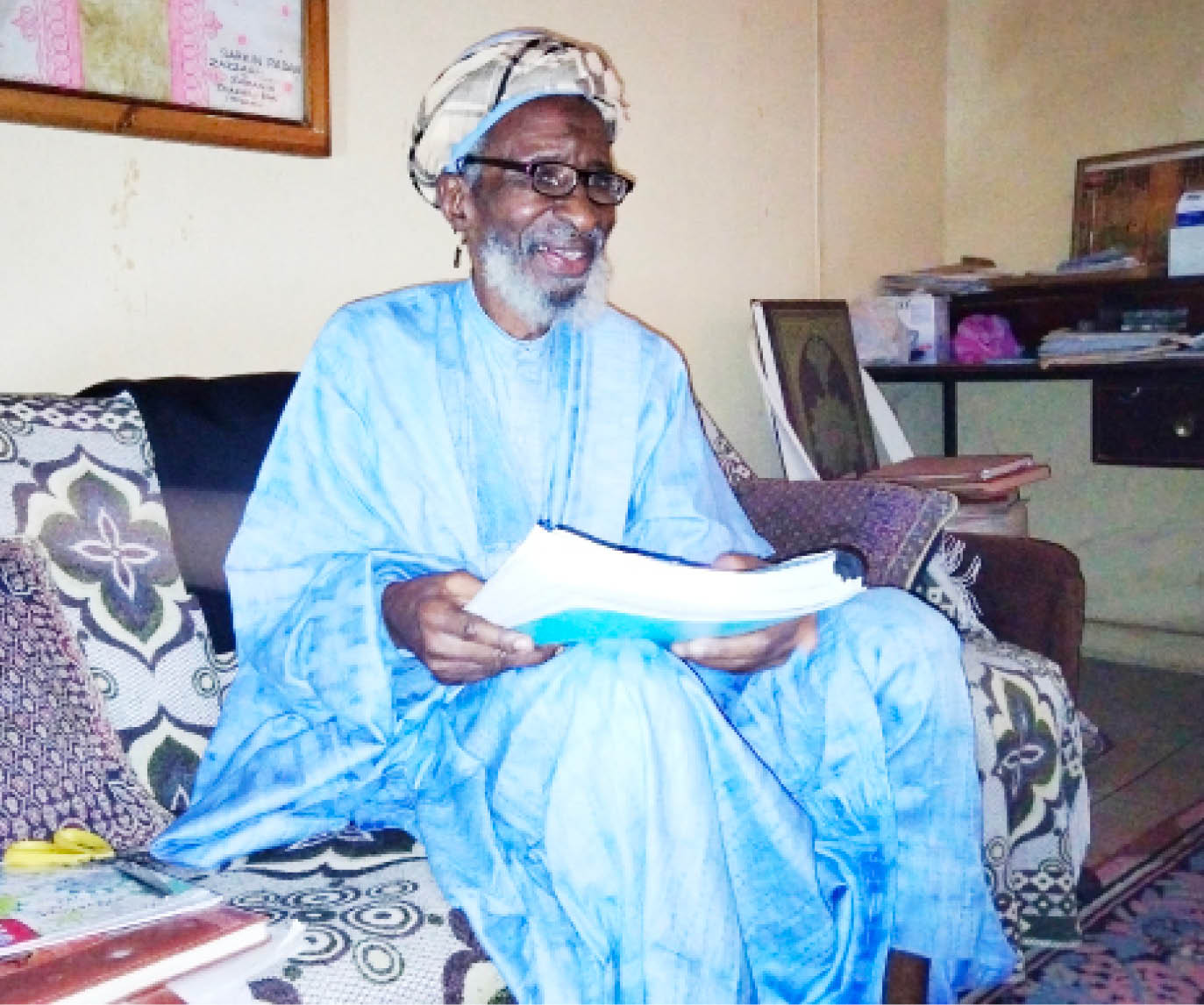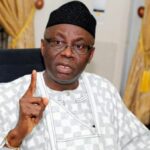Alhaji Abbas Dabo Sambo recently turned 86. He started his civil service career right from the colonial era. The former administrator of the Kaduna Capital Territory, former capital of the Northern Nigerian Government in the 1960s, was also a divisional officer of the Jos and Hadejiya Division in the same year. A former permanent secretary in the defunct North Central State of Nigeria, later named Kaduna State from 1969, he was also the chairman of the Federal Government Public Accounts Committee in the 1980s. In this interview with Daily Trust on Sunday, Alhaji Abbas spoke about his childhood, why civil servants and politicians go after illegal wealth instead of serving the people and other issues.
How would you describe your early days in life?
I was born on September 16, 1935, so I became 86 years old this September, going by the Gregorian calendar, but 88 according to the Islamic month. I was born in Anguwan Juma ward, Zaria.
We are Fulani from Futo Toro in Senegal. This is about 180 years ago. I want to talk briefly on how we came to Zaria. My great grandfather, Malam Muhammadu Abubakar Malam, came with his wife, called Hauwa and his pupils from Mali, later to ’Yandoto in the then Sokoto province. From there, he heard of some Arabic ulama in Maiduguri, Borno, who came from Egypt with their people, and he met them. Two of them decided to come to Zaria when they heard there were Muslims but no Islamic teachers there. When they came to Zaria, Malam Abubakar was appointed as the senior among the two travellers.
They built the first central mosque in Zaria, which was not far from our house. When I say our house, I mean the house where Malam Abubakar Malam stayed up to the end of his life. That was how we came in. From my mother’s side it was the same. When they came from Senegal, they stayed at Anguwan Liman.
I was the second child of my mother. Ambassador Sani Sambo was just two years and eight months older than me. The third child, Umaru, died at the age of three or four; I was five or six years old then. And my mother loved me very much.
In the olden days, the firstborn was not allowed to stay with his mother; if there was a second wife she would take care of him. So my elder brother did not stay in the same room with us.
As a child, I loved cow butter (the Fulani butter). I used to worry my mother to give me some money to buy the butter. They said it was the best for cold, particularly for the Fulani living in the North who grazed in the open. I later went for my elementary education at the only elementary school in Zaria then, which catered for pupils from Zaria and Tudun Wada. It was after about 15 years that an elementary school was built in Tudun Wada. The school was not far from our house.
Also, my father was a medical man. He was to go to Katsina College, but the white men selected him and one other person from a ward called Fada, near the palace. They were sent to Lagos for a three-year course in medicine.

When my father came back, he was allowed to stay in Tudun Wada, under the medical house set up in those days. The other person was sent to Sokoto, where he lived till the end of his life.
My father was the first person to head the Medical Department of the Native Authority. And that was not very far from our house.
For the three years he spent in Lagos he was taught how to do all sorts of operation. When he came back, he used to check the elderly men and women in the ancient city. He used to go to treat them, and because of that he was nicknamed Sambo Dan Abbas. Abbas was his father’s name. He treated and gave them shillings. One shelling was big money in those days.
He later moved to Sabon Gari, from where he was appointed as district head in Anchau, Kubau, in 1945. The emir then was Sarki Jafaru, the father of the current Madakin Zazzau. The reason for sending my father to Anchau was because there were Europeans trying to fight what we call ciwon bacci (trypanosomiasis). The white men wanted someone who could speak English because there were three white people. I knew it because I had finished my elementary school. We were 35 in my class.
Which year was that?
It was in 1946. And we were there for five years by luck. I got all my certificates. After that education, I wanted to go to the middle school, but our English mistress insisted that my English was very good and I should attend the school where her husband was the principal; so we went.
After that, I took a new appointment in Zaria Central Office under Sarki Jafaru, as a typist. I think that in the whole of Zaria city, apart from the clerical college, you could not find anyone who could type as fast as I did. And that helped me very much because my salary was 6pounds, 15 shillings. Because of my speed, the Northern Nigeria Association engaged me to type for them privately for three days. They gave me their typewriter, so I did not use the one in my office. I would go there on Fridays because native authorities and emirs did not work on those days. But the white people insisted we changed the holidays to Sundays. So on Sundays I would earn like two pounds. It was good money in those days.
I also engaged in farming. I was doing very well, just chilling around. I would buy a ram and ask my elder brother, Sambo, and a friend, Shehu, who later became a senior judge in the federal judiciary, to slaughter it and share into three. They would give me two slots. My father died on June 12, 1957. He was liked by the Emir of Zazzau, Jafaru, and the colonial powers.
The colonial powers had the habit of helping you if you were working with them and you were good. If you were upright, they would help you. If you were good and you got some problems, they would help you sort it out. In the northern Nigeria civil service, I can write a small book on the people the Europeans assisted. This is what we got before Independence. They would help the willing person and deal with the stupid one.

Tell us about your childhood friends
My childhood friends have all died. The last one died 22 years ago. I can remember Dogara, Aminu Yellow and Lawan Sa’idu who lived in Jos, as well as Muhammadu and Saidu Captain. We used to play football together. Saidu Captain was our team captain. I also had another friend called Kantoma. We called him Kantoma because of his giant nature. There were also Abdullahi and Musa. They were 15 of them, and we played together while growing up. Their children still visit me at home.
How long have you been at Unguwar Sarki?
I have been here since 1976. I built this house before I retired from the civil service in 1979, at the age of 45.
You retired at 45, was that the retirement age?
No, I thought I had had enough, even though I was to be transferred to Lagos because there were vacancies for federal appointments. They said two people from the North and two from South were needed. Alhaji Sule Katagum, our boss, wanted to send a permanent secretary to Lagos and they needed two northerners. It was during the era of Governor Abba Kyari. After the interview I was told that I would be posted to Lagos. The truth is that as a village man I did not even enjoy city life; I didn’t like Kaduna life, not to talk of Lagos. What would I want to do in Lagos? So I said I would not go. Some people thought I was charmed to refuse to go, but I said nothing of such happened. I just didn’t want to go. Garba Ja, the secretary to the government tried to convince me to accept the offer, but I declined. He also contacted his friend and classmate, my elder brother, to talk to me to accept the appointment, but I still refused.
How would you compare the civil service then and now?
Sincerely, it is a matter of sorrow. Now, the boss is only interested in himself. This is 70 per cent of what is happening in our ministries, departments or even divisional offices.
Where did we get it wrong?
It is hard to say because, fundamentally, people do not want to find out from their minds, how they live. How do I administer what I get? This is the issue because government earns and spends. I think there is the need for a serious orientation on the part of the civil service because they are not thinking about their budget.
Budget padding is a problem because when you come to implementation you are going to have a problem. This is because what you have shown as the figures are totally more than the actual thing in the budget.
I blame the auditors for not doing their job as expected. I realised all these in the Ministry of Finance when I called for a meeting of a committee. I usually insisted that government’s printer must be brought for me to crosscheck. I got this idea since I was a chief accountant at the Native Authority years back. Now, when they come to audit, I am telling you that they would just do 20, 30 or 40 per cent check and say it is okay.
There is no commitment, so I don’t know how we can get it right. But maybe training and re-training of civil servants would help. This is because in my days, you would not be a senior officer in a ministry or any department for three years without going on training for three or six weeks. In 1973, I went for a six-week training in Britain for senior officers from all the British colonies. Seventeen colonies attended. I never knew that Kuwait was also a colony until then because the deputy prime minister of Kuwait was there too.
You see, your mindset would be changed because all sorts of professors were there cautioning you to be careful because our countries had started exploring crude oil and we would get corrupt people coming into our countries from all over the world. It was a 73-year-old professor that told us all these things. He said such people would want to be our friends since we were holding senior positions, so we must be careful.
As a former chairman of the Merchant Bank, how do you see financial institutions then and now?
In our days nothing would pass through your desk unless it was cleared and confirmed. Without that, it would be difficult to work on. Whatever we did we tried to be sincere and honest. I remember that during our first meeting at the board of the bank, somebody proposed that as chairman I should be given the authority to approve loans up to N1 million and they all agreed, clapping, when I knew that the federal government had 51 per cent shares and the bank 49 per cent. Alhaji Mutallab was the vice chairman. I told them that there should be a rider before the approval, and that the vice chairman shall support in writing, what the chairman shall approve. They all kept quite. I think we only gave N1 million loan to one person. And till I left, that was the position.
Chief Falae was the managing director and Shehu Ismail was the governor of the Central Bank of Nigeria (CBN). He later became a finance minister during the administration of Abdussalami Abubakar. We once met and he was surprised that I had not forgotten that incident. I said I could not forget that meeting.

So you were not tempted to amass wealth as a chief executive officer?
If I wanted, I would have done it through the allowances they were giving me from Kano and Jos. But I did not want it. This is why I don’t have any illness at my age; thanks to Allah. I don’t have any health challenge and I don’t have any debt to pay.
Why do you think some chief executive officers and politicians are amassing illegal wealth?
There are reasons for that, but it depends on your upbringing. For me, if you wanted something from my father you would get it, but if he didn’t have, he would tell you to come back another time. He was a medical man and people used to praise him, saying that Sambo, son of Abbas, would give patients medicine and money to eat so that it would work. That was how we grew up to know him. When someone came to beg for cloths he would be taken to a tailor to give him a set of cloths and a cap. From 6:30pm daily, food was brought out for people to eat, the same thing at 7:30 am. They would come for breakfast. I remember that a man once asked my dad, “Why are you doing this; what will you keep for your children?” He replied, “What did your father, Abdullahi, give you, if not blessings? It is the same blessings they gave me that I will also give to my children.” The man thanked him for reminding him of that. So people need to be contented in life and seek for blessings instead of amassing wealth.
You resigned in most of the positions you held while in active service, why?
It has been my belief, up till today, that if something is not moving well, one should quit. You know I am not anybody’s boy and I will not be, God willing. I have seen what many have not seen in life, since 1954.
Did you not regret your decisions?
Not at all. My children are surprised how I live my life. Whatever money that comes my way, I share it into three—one part to charity, another to people that need my help because many people prefer coming to my house, especially after magrib prayer, for assistance, and I give them the little I have; and the last for myself. This is how I live.
Did you resign out of pride or what?
You have said it already. I have pride in me. I don’t want anything from anybody. God gives me, and if I depend on humans God will leave me alone.
What informed your recent call for restructuring?
When this political evolution started in Nigeria, nobody took it as a business making venture. In those days, farmers were made to ensure they held their farms/hoes, cattle breeders the same. If you were teaching you taught very well, but now, it is a deep concern as everybody is trying to be a politician to make money, not necessarily to serve the public.
Unfortunately, our textile industry and other companies in northern Nigeria have stopped functioning, with no commitment to revive them. It is a shame on the entire northern governors and Nigerian politicians to see all the textile companies dead. The sad thing is that the money they hide in Dubai will never come back.
I think there is the need for a change of mindset. I am sure you know how it was years back. People came from everywhere to buy from our textile companies. Even labourers who helped to carry loads into vehicles were benefitting; but now, all these things are no more. Where are we? And the politicians are only interested in making money for their children and grandchildren. If you ask the politician why he is doing that, he will say that things have changed and it is better for a child to be educated in London and America rather than Ahmadu Bello University (ABU) or Bayero University, Kano (BUK). If you ask him how he got the money to pay for his child’s education abroad he will not answer because he knows it is public money. So we have to look back and be careful with this idea of keeping it for our children, grandchildren and great grandchildren.
We heard you were writing a book, when are you planning to launch it?
The book has 430 pages, I am going to launch it in October, God willing. I am correcting the pictures and their captions. It took me roughly two years to complete the book.
Why did you decide to write an autobiography?
I decided to write the book because a lot of people of like-minds and of my age did not do that. And of course I will pass away some day, so I need to tell something about our lifetime. I understand it is not easy because you need to have some documents to back what you are saying. You need to have a real composition of yourself.
How do you want to be remembered?
I want to be remembered as an almajiri (knowledge seeker) looking for a way of life.
What is your favourite food?
Any kind of swallow (tuwo).
Can you talk about your family?
I have two wives and 16 children—eight males, eight females.

 Join Daily Trust WhatsApp Community For Quick Access To News and Happenings Around You.
Join Daily Trust WhatsApp Community For Quick Access To News and Happenings Around You.



